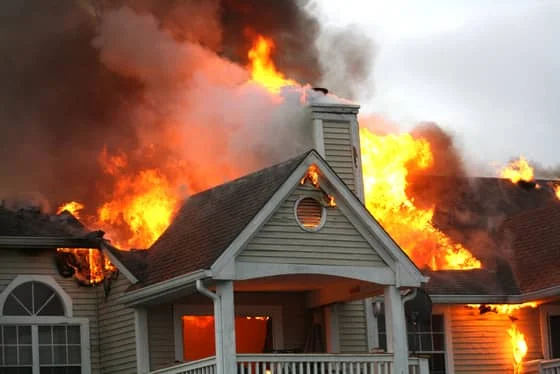Electrical fires indeed are among the most dangerous and misunderstood types of home fires. Despite the natural instinct to douse flames with water, the question remains—can you put water on an electrical fire?
In recent news, electrical fires have been a significant concern, with various incidents highlighting the need for increased safety measures. On November 16, 2024,an electrical fire which broke out in a residence located in east windsor new jersey, required several fire departments in the area to assist in putting out the fire. At the same time, a report of a fire in the downtown area in Ashland Oregon was attended to and concluded quite rapidly as the cause turned out to be an electrical fault rather than an active fire.
The United States Fire Administration (USFA) report highlights a concerning trend. Residential fire deaths due to electrical equipment failure have surged. Over the past year, there has been a 60% increase in these incidents.
This concerning statistic highlights the need for homeowners to understand electrical safety, regularly perform safety checks, and quickly address electrical issues to protect their homes and loved ones.
What Causes Electrical Fires in Homes?
Most of the time, electrical fires can be associated with some of the common activities done in a household. To reduce your risk, it’s important to know the main causes and take precautions quickly when a problem arises:
- Faulty Wiring: Especially in older homes that have outdated systems which have been unable to keep pace with the current power demands in the society.
- Overloaded Circuits: Excessive electrical load can overheat circuits, leading to fires.
- Malfunctioning Appliances: Faulty appliances can spark fires due to internal failures.
Be alert to these warning signs:
- Burning Smell: Before any visible smoke or flames, often the first noticeable signal is the distinctive odor of burning plastic or rubber providing a timely window to take action.
- Flickering Lights: This can indicate an issue with your electrical system.
- Sparking Outlets: Sparks are a clear sign of electrical trouble.
- Frequent Circuit Breaker Tripping: The circuit has likely been overloaded or is faulty based on the recurrent trips.
Remember, never put water on an electrical fire, as it can increase the risk of shock or spread the flames. Always prioritize safety and address potential hazards promptly.
Why You Should Not Put Water on Electrical Fires
When faced with a fire, your immediate reaction might be to reach for water. However, if you put water on an electrical fire, it can make the situation worse.
Water is a good conductor of electricity, making it dangerous to use on electrical fires. Using water can increase the risk of electric shock. This approach can also worsen the situation by sustaining the fire.
In place of simply using water, think about alternatives such as employing a Class C fire extinguisher. This device is specifically made for tackling electrical based fires. These fire extinguishers possess an beneficial feature that allows them to put off flames without the risk of electric conduction by using non-conductive material. Alternatively, a more classic approach entails the use of baking soda, which is claimed to be effective in stifling the small flames of electrical fires.
Safety Measures to Prevent Electrical Fires
It is always better to prevent than cure when it comes to electrical fires. Below are some of the measures to take:
- Regular Inspections: Occasionally inspect your house’s wiring and circuits for any fraying wires and excessive circuit use.
- Functionality Checks: Ensure all outlets and switches are working properly.
- Professional Maintenance: Consider hiring a professional electrician for routine maintenance checks.
- Fire Safety Invest in a Class C fire extinguisher and keep it in an easily accessible location.
- Make sure all family members know how to use it—remember, you never put water on an electrical fire, as it can worsen the situation.
- Surge Protection: Use surge protectors and refrain from putting excessive electronic devices on power strips to avoid their overload.
When a device is not in use, it should be disconnected from the power source. This can help cut back on heat build up and chances of fire outbreak caused by electric devices.
What to Do if an Electrical Fire Breaks Out
In the unfortunate event of an electrical fire, stay calm and follow these steps:
- Cut the Power: If it is appropriate to do so, switch off the electricity supply to the affected zone in order to avoid further fire hazards, while also minimizing the risk of electric shocks.
- Use the Right Extinguisher: If the fire is in control, reach for a Class C fire extinguisher or baking soda.
- Evacuate the Premises: In the event of a growing fire, safety comes first by ensuring that everyone evacuates the premises and emergency services are called without delay.
- Consult Professionals Post-Fire: After the fire, consult professionals to assess damage and restore your home safely. You might explore options like purchasing fire-damaged homes for sale or learning how to remodel your home after a fire.
Conclusion
Electrical fire safety isn’t just about responding effectively—it’s about proactive prevention. Remember, if you put water on an electrical fire, you risk exacerbating the situation. Furnish your residence with appropriate equipment, keep abreast of safety measures, and perform periodic maintenance.
Putting particular emphasis on electrical fire safety enhances a family’s shield from internal threats. For additional material, feel free to consult fire experts who can walk you through the procedure of maintaining your premises.

